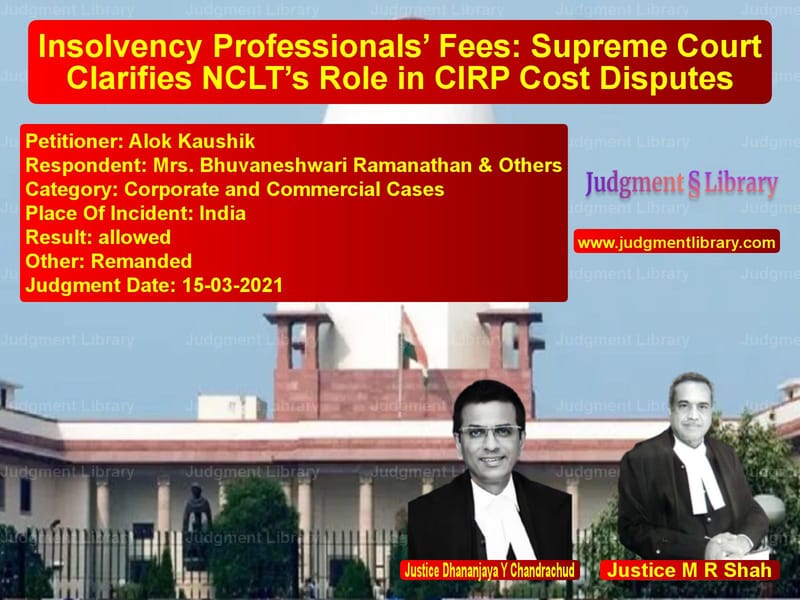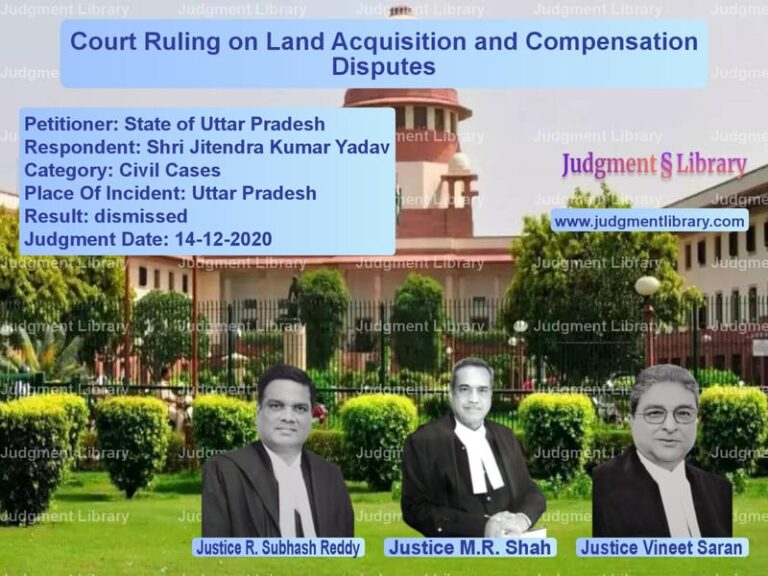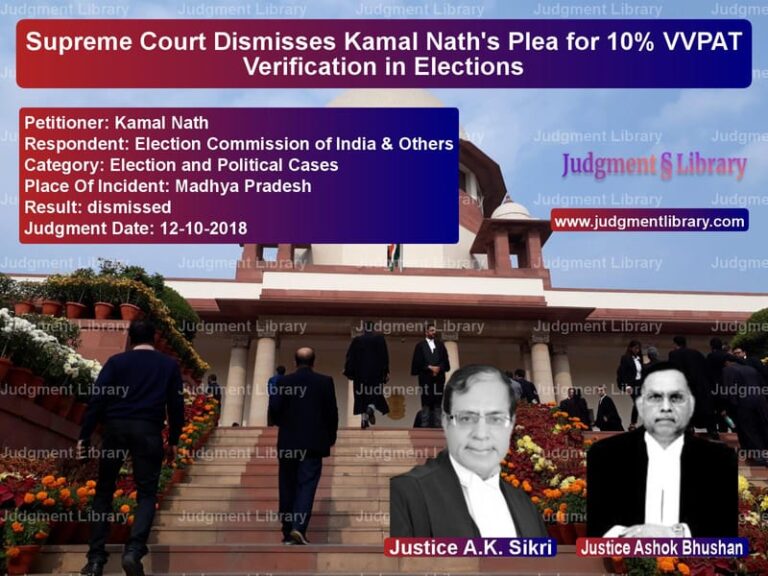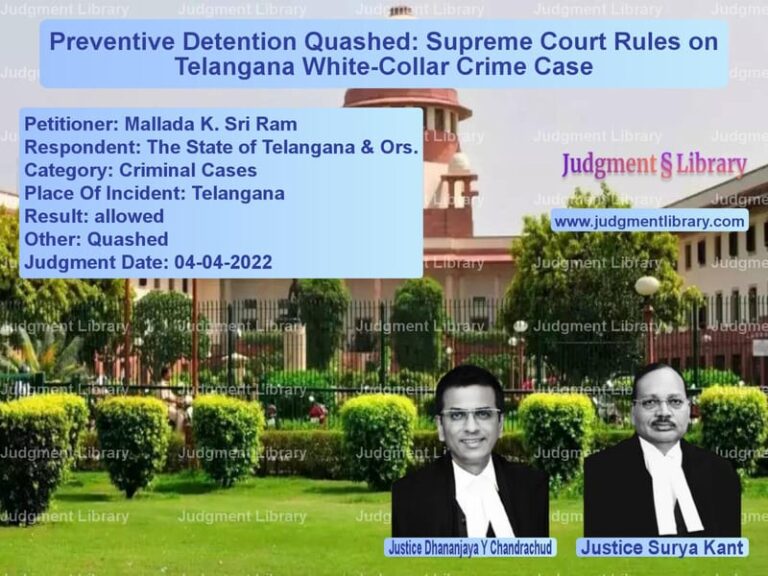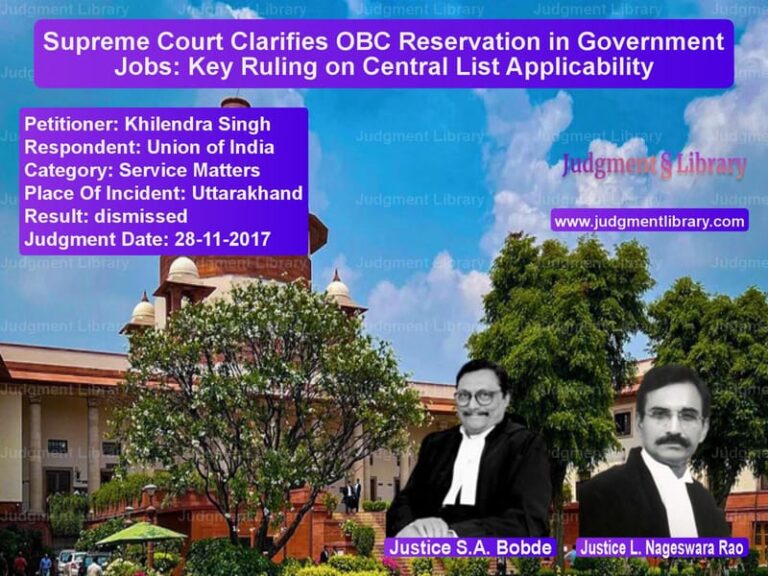Insolvency Professionals’ Fees: Supreme Court Clarifies NCLT’s Role in CIRP Cost Disputes
The case of Alok Kaushik vs. Mrs. Bhuvaneshwari Ramanathan & Others is a landmark judgment by the Supreme Court of India dealing with the determination of costs, fees, and professional charges under the Insolvency and Bankruptcy Code, 2016 (IBC). The case revolved around the appointment of a registered valuer during the Corporate Insolvency Resolution Process (CIRP) of Kavveri Telecom Infrastructure Limited and the subsequent dispute regarding the non-payment of fees.
The judgment clarified the authority of the National Company Law Tribunal (NCLT) in adjudicating claims for professional fees when the CIRP is set aside. The Supreme Court reinforced the principle that professionals involved in the insolvency process are entitled to fair remuneration for work done, even if the CIRP is later annulled.
Background of the Case
The appellant, Alok Kaushik, was appointed as a registered valuer for the plant and machinery of Kavveri Telecom Infrastructure Limited under Regulation 27 of the Insolvency and Bankruptcy Board of India (IBBI) Regulations, 2016. His appointment was ratified by the Committee of Creditors (CoC), and he was tasked with valuing assets at 115 sites across India.
The key timeline of events:
- March 21, 2019: The NCLT initiated CIRP against the corporate debtor.
- August 26, 2019: The first respondent was appointed as the Resolution Professional (RP).
- September 16, 2019: The appellant was appointed as the registered valuer.
- December 18, 2019: The National Company Law Appellate Tribunal (NCLAT) set aside the CIRP.
- December 19, 2019: The RP canceled the appellant’s appointment and asked for a waiver of fees.
- March 2, 2020: The appellant was paid only Rs. 50,000, despite having completed most of the valuation.
- June 29, 2020: The NCLT dismissed the appellant’s plea for payment, stating that it had become functus officio (lacking jurisdiction).
- October 13, 2020: The NCLAT upheld the NCLT’s decision.
Legal Issues Raised
1. Whether the NCLT Has Jurisdiction to Determine Fees Post CIRP Cancellation
The appellant contended that the NCLT, as an adjudicating authority under the IBC, retained jurisdiction to determine insolvency-related costs even if the CIRP was annulled.
2. Rights of Professionals Engaged in CIRP
The appellant argued that he had performed substantial work and was entitled to remuneration, even if the insolvency process was later set aside.
3. Application of Section 60(5)(c) of the IBC
The Supreme Court considered whether the NCLT could entertain claims for professional fees under Section 60(5)(c) of the IBC, which grants it jurisdiction over matters related to insolvency proceedings.
Supreme Court’s Observations
The Supreme Court made the following key observations:
- The NCLT and NCLAT erred in holding that they lacked jurisdiction. Section 60(5)(c) of the IBC empowers the NCLT to adjudicate claims arising from the CIRP.
- The CIRP costs, including the fees of professionals, are covered under Section 5(13) of the IBC and Regulation 34 of the IBBI Regulations.
- Merely because the CIRP was set aside, professionals engaged in the process cannot be left without compensation.
- The appellant had conducted valuation work for 84 sites and had incurred expenses that had not been reimbursed.
Final Verdict
The Supreme Court allowed the appeal and remitted the case back to the NCLT for fresh determination. The key directions were:
- The NCLT must assess and determine the amount payable to the appellant.
- The prior order of the NCLT refusing jurisdiction was set aside.
- The appellant’s claim must be treated as an insolvency resolution cost.
- The adjudicating authority must ensure that professionals engaged in CIRP are fairly compensated.
Implications of the Judgment
This ruling has significant implications for insolvency law and professional rights:
- Ensuring Fair Compensation: Professionals engaged in CIRP are entitled to remuneration even if the process is later annulled.
- Broadening NCLT’s Jurisdiction: The NCLT has the authority to adjudicate fee disputes arising from insolvency proceedings.
- Strengthening Creditor Confidence: Creditors and professionals will have greater certainty regarding cost recovery.
- Preventing Unjust Enrichment: The ruling ensures that professionals are not denied their rightful dues due to technicalities.
The judgment reinforces the legal framework ensuring that insolvency professionals and valuers are fairly compensated for their work, contributing to a more robust insolvency resolution process in India.
Petitioner Name: Alok Kaushik.Respondent Name: Mrs. Bhuvaneshwari Ramanathan & Others.Judgment By: Justice Dhananjaya Y Chandrachud, Justice M R Shah.Place Of Incident: India.Judgment Date: 15-03-2021.
Don’t miss out on the full details! Download the complete judgment in PDF format below and gain valuable insights instantly!
Download Judgment: alok-kaushik-vs-mrs.-bhuvaneshwari-r-supreme-court-of-india-judgment-dated-15-03-2021.pdf
Directly Download Judgment: Directly download this Judgment
See all petitions in Bankruptcy and Insolvency
See all petitions in Corporate Compliance
See all petitions in unfair trade practices
See all petitions in Judgment by Dhananjaya Y Chandrachud
See all petitions in Judgment by Mukeshkumar Rasikbhai Shah
See all petitions in allowed
See all petitions in Remanded
See all petitions in supreme court of India judgments March 2021
See all petitions in 2021 judgments
See all posts in Corporate and Commercial Cases Category
See all allowed petitions in Corporate and Commercial Cases Category
See all Dismissed petitions in Corporate and Commercial Cases Category
See all partially allowed petitions in Corporate and Commercial Cases Category

